Northeastern University Progressive Student Alliance (PSA) has been fighting for social and economic justice since 2008. As an affiliate of United Students Against Sweatshops (USAS), the nation’s largest youth-led student-labor solidarity organization, we run locally and nationally coordinated campaigns alongside workers on our campus and across the globe. While our organization primarily focuses on workers’ rights, we understand that all oppression is connected. PSA values collective liberation – we strive to build relationships with other grassroots movements because we believe the student-labor solidarity movement is part of a larger struggle for global justice. Whether supporting service workers on our campus or factory workers making Northeastern apparel around the world, PSA is committed to making real and tangible change.
Justice for Campus Workers
As students, we tend to view our universities primarily as educational institutions. However, universities also serve as employers to thousands of members of our community, with many schools being among the largest employers in their city or state. Northeastern would fail to operate without the labor of faculty, teaching assistants, research assistants, dining hall staff, programming staff, academic and co-op advisors, custodians, resident assistants, security guards, student employees, and all other campus workers. These people are all integral members of the Northeastern community, and in order for this community to thrive, it is essential that students and workers support and uplift each other.
Unfortunately, Northeastern’s track record as an employer has not always been a positive one. This has led many campus workers to form unions in order to collectively bargain for better working conditions. As much as we wish the university would be receptive to workers when they state their need for things like higher wages, better health care, job security, and positive work environments, the reality is that it often takes quite a bit of pressure for Northeastern to agree to these changes. This is where students come into the picture. If we organize alongside campus workers to apply this pressure, Northeastern is twice as likely to feel the heat and give in to workers’ demands.
We know from experience that when students and workers unite to run strategically coordinated campaigns, our victories create a domino effect for workers on other campuses as well. In this way, our work towards labor justice at Northeastern can improve the standards of working conditions throughout the city, state, and even the country. And our fight is far from over! Right now, full-time non-tenure-track faculty at Northeastern are organizing for the right to a union election, and the Progressive Student Alliance (PSA) is leading the student movement to support them in this fight. Check out the history of PSA’s student-worker solidarity campaigns at Northeastern below!
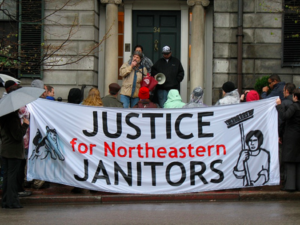
In 2008, PSA launched the Justice for Janitors campaign, supporting Northeastern janitorial staff in their call for a union, fair wages, and health benefits.
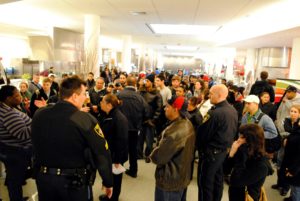
In 2011, PSA started the Huskies Organizing With Labor (HOWL) coalition to support Northeastern dining hall workers’ fight for a fair contract.
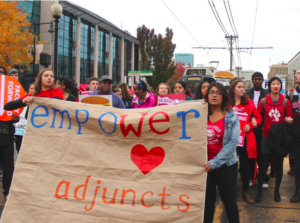
In 2016, Northeastern adjunct faculty won the right to form a union after PSA led a multi-year student solidarity campaign.
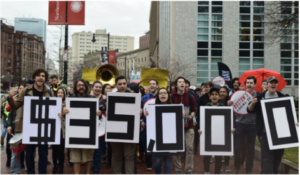
In 2017, PSA brought back the HOWL coalition to win a $35,000 base salary for dining hall workers.
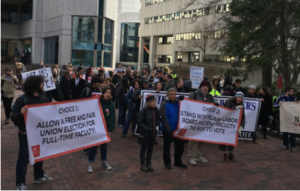
Now, in 2019, PSA is organizing in support of Northeastern full-time non-tenure track faculty’s right to a free and fair union election. Find out more about this campaign later in this guide!
Solidarity with Garment Workers
Students can also play an integral role in supporting the fights of workers overseas, who produce the apparel that Northeastern sells in the bookstore and dresses our sports teams in. Universities hold multi-million dollar contracts with brands like Nike, Adidas, Under Armour, and others to produce this clothing. These brands cut production costs by subcontracting factories in the global south, where labor regulations tend to be weaker than in the US. This allows corporations to get away with paying workers below a living wage and forcing them to work under unsafe, sweatshop conditions. When workers in these factories attempt to organize against this exploitation, brands often pull production out of factories with strong worker unions, leaving thousands of workers suddenly without jobs. This recently happened at the PT Kaho factory in Indonesia, where Nike pulled production in an attempt to bust the workers’ union, and used threats to force workers to resign without their full legally-required severance pay.
Corporations rely on university contracts for a significant portion of their income, and because of this, universities are able to demand that the brands producing their apparel are providing safe and fair working conditions for the workers in their factories. Many universities, including Northeastern, have partnerships with the Workers Rights Consortium (WRC), an independent monitoring agency, co-founded by student organizers in USAS, that goes into factories to report back to universities on the conditions of workers producing their school apparel. When workers rights abuses occur, brands are acting in violation of their contracts with WRC-affiliated universities, which require factories to meet safe and fair working standards. This allows universities to cut their contracts with brands who refuse to take reparative action for these abuses.
This is where students come in. Worker unions in these factories have strong relationships with USAS, and they reach out to us for support when abuses occur. Students can pressure their universities to end contracts with brands who are exploiting workers, and when brands lose the millions of dollars these contracts provide, they are forced to meet workers’ demands to get these contracts back. When USAS locals at multiple universities (including Northeastern) ran campaigns to get their schools to cut contracts with Nike in 2017, our impact forced Nike to sign a landmark agreement allowing full WRC access to their factories. Check out the history of PSA’s international solidarity campaigns at Northeastern below!
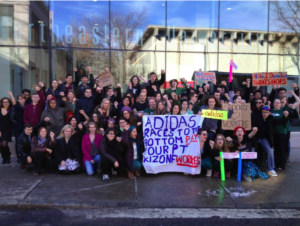
In 2013, a PSA campaign successfully ended Northeastern’s contract with Adidas after the brand refused to pay severance to workers.
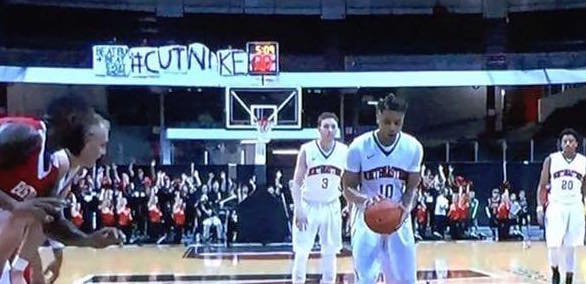
In 2017, PSA won a campaign to end Northeastern’s licensing contract with Nike until they allowed WRC access to their factories.
What is a Union Anyways? Busting Myths about Unions
For starters, a union is a group of workers who join together to bargain collectively over their working conditions. If one worker were to go to management asking for a raise, it would be easy for management to ignore their request, but when an entire group of workers come together to demand a raise, their management is far more likely to listen to their concerns. Unions allow workers to have a say in the decisions that affect them everyday, and without unions, all of the power in a workplace is in the hands of the bosses. Unions are a crucial tool for workers to take this power back and guarantee rights in the workplace. In the US, unions are the reason we have things like the 8-hour workday, paid sick leave, and child labor laws. People in all types of workplaces can form unions to ensure that they are treated fairly and protected from exploitation.
Over the past few decades, right-wing anti-worker movements have been methodically stripping labor unions of the power they once had. Misleadingly-named “right to work” laws play a major role, but the shift in power away from workers relies on calculated anti-union myths and narratives. As a result of these efforts, the rate of union membership has halved since 1983 (Bureau of Labor Statistics, 2017). Everything that has greatly improved working people’s quality of living (weekends, 8-hour workdays, paid sick time, etc.) had to be wrestled from the grip of the ruling class by a massive and well-organized labor movement. Union-busting is standard practice for corporations, but universities (Northeastern included) deploy the same myths in their attempts to deny workers the benefits of collective bargaining. Here are a few union-busting myths you might come across, if you haven’t already:
MYTH: Unions can force you to join them. We need “right to work” laws!
FACT: Closed shops, or workplaces in which all workers have to be union members, have been illegal in the U.S. since 1947 (See the Labor Management Relations Act of 1947 [Taft-Hartley Act]). Typically, a worker in a unionized workplace who does not want to join the union must pay an “agency fee” or “fair-share fee,” which covers the union’s collective bargaining activities, but not any political activities. This fee prevents freeloading because a contract covers all workers, whether they’re in the union or not. “Right to work” laws make such fees illegal in the private sector. So “right to work” really means “right to benefit from a union without paying for it.” When freeloading is an option, unions tend to lose members, and thus lose power. Because less powerful unions mean less protection for workers, “right to work” measures are anti-worker legislation disguised in the language of workers’ rights.
MYTH: Unions are outside third parties that threaten the trust between workers and management.
FACT: Unions are the most democratic institution that can be introduced into a workplace. In non-union workplaces, management dictates everything. Organizing a union is the only option workers have if they want a legally-protected say in how their workplace operates. Every decision–forming the union, choosing a larger union to affiliate with (or organizing independently), ratifying a contract, even decertifying the union–can only happen if a majority of the workers approve.
MYTH: Unions are bloated bureaucracies. (Something something fat cats!)
FACT: Not all unions are created equal. Many have staff who are dedicated organizers with a focus on building the power of rank-and-file members, while others might be inefficient, undemocratic, corrupt, or even racist. The fact that certain unions are flawed is not a reason to write off unions in general, as many bureaucratic and corporate-friendly unions are still arguably doing more good than harm. (Not the racist ones, though. They suck.) Luckily, democratic movements within large, corporate unions have had some success in shifting their unions’ priorities back towards their members (see Teamsters for a Democratic Union). As future workers, we need to play a part in pushing unions to be truly democratic institutions, rather than forsaking them and disenfranchising workers completely.
How can I join the fight for labor justice at Northeastern?
Get involved in Progressive Student Alliance - new members are always welcome! Check out our Facebook page (@psa.neu) and the USAS website (usas.org) for more info on our campaigns, and join us at our weekly meetings on Tuesdays at 7:30pm in the Social Justice Resource Center.